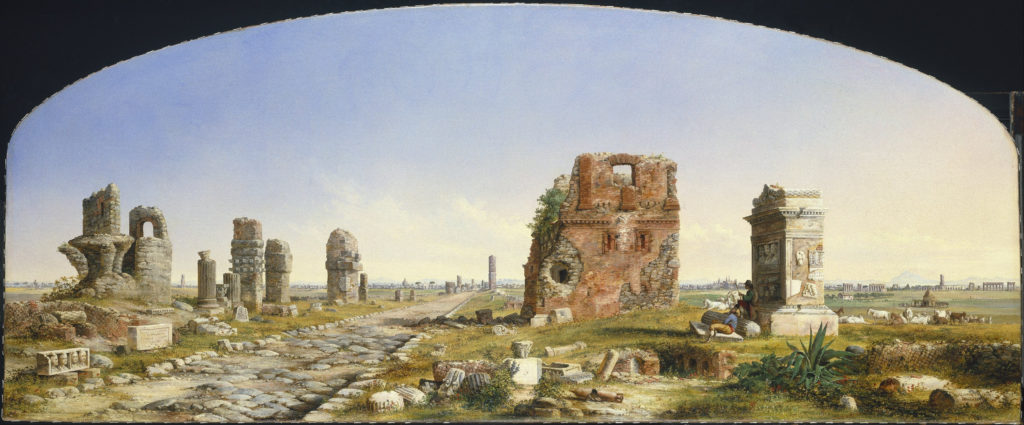[Greek] κοιμάω (koimaō), [Latin] dormire: to sleep (in a cemetery), to be asleep, to be in a coma, to be dead, to put to sleep, to fall asleep, to slumber, to decease, to be deceased, to put to bed; Mt. 27:52, Mt.28:13, Lk. 22:45, Jn. 11:11-12, Acts 7:60, Acts 12:6, Acts 13:36, 1Cor.7:39, 1Cor.11:30, 1Cor.15:6, 18,51, 1Thess.4:13,5, 2Pet.3:4

The Appian Way: a painting by John Linton Chapman (1869). Tombs and graves were placed along the road out of Rome.
Background Information:
Greco-Roman Culture: This term is primarily used as a euphemism (falling sleep) for death. Homer recounts Agamemnon, slain with an arrow, fell and slept (died). Sophocles recounts Myrtilus resting beneath the waves. In ancient times, resting places were also known as dormitories, sleeping places, and bedrooms. Such burial places were placed some distance from the towns. Outside of Rome, tombs, monuments, and mausoleums were placed along the roads. In the early Christian era, deceased Christians were placed in pagan tombs, operated by funerary associations. Thousands of travelers made frequent pilgrimages to various temple grounds throughout the pagan world. Inns and lodging (resting and sleeping places) were built nearby to accommodate these weary travelers.
Old Testament: This term is related to the Hebrew term shakab, which has the basic sense of lying down. The Old Testament world presents a much simpler culture than the cosmopolitan Greco-Roman world. Interestingly, in the Old Testament culture, this term takes on various meanings. This term can mean to be killed, to lie (rest), to lie down for sexual relations, to lie down to recover, to be ill, to be humbled, to be laid to rest, and to lodge. Let us lie down in our shame (Jer. 2:25). Where he sank down, there he fell, slain (Jdg. 5:27). The mother took him upstairs and laid him on the bed (2Kgs. 4:21). He found the boy lying dead (2 Kgs.4:32). Whoever sleeps or eats in such a house shall also wash his garments (Lev. 14:47). You shall know (die) the Lord Hos. 2:20). He went out to sleep on his bed among his lord’s servants (2 Sam. 11:13). And their wives ravished (Isa. 13:16).
New Testament: This term is used in a more limited sense, meaning to sleep and to be dead. Used primarily as a euphemism for death, this term is never used for spiritual lethargy. For the Christian, the grave is associated with the idea of a calm and undisturbed repose with the hope of a resurrection. As in the episode with Lazarus, the distinction between sleep and death may not be clear. In Pergamum, one of the seven cities mentioned in the Book of Revelations, Christians were facing formidable pagan influences. Ascelpius, the god of healing, found great favor among the people. At the Asclepion (temple), the patients would gather in a dormitory (sleeping room). The god, by the means of entering into the patients’ dreams, would provide them with their cures.
Scripture:
“Then Stephen fell to his knees and cried out in a loud voice, ‘Lord, do not hold this sin against them’, and when he said this, he fell asleep.” Acts 7:60
Stephen was being stoned to death and later died.
“On the very night before Herod was to bring Him to trial, Peter secured by double chains, was sleeping between two soldiers.” Acts 12:6
Peter was sleeping in the normal sense of exhaustion.”
“The chief priests assembled with the elders and took counsel; then they gave a large sum of money to the soldiers, telling them, ‘You are to say, His disciples came by night and stole Him while we were asleep.’” Mt. 28:12-13
The chief priests and elders appeared to make contingencies on the event that Jesus’ body disappearing from the tomb. The chief priests and elders did not want to allow the story of Jesus’ resurrection to start.
Conclusion:
Cemetery, coma, comatose, sepulcher
Even the Greeks and Romans had different views about death and the afterlife. The Greeks believed that the memory of the dead was necessary for the existence of the spirit in the afterlife. The Romans were buried in cemeteries (and other places) outside the city in order to mark the divide between the land of the living and the land of the dead. With the rise of Christianity and lack of space, catacombs were dug underground.
I was quite surprised by the many varied uses of this term in the Old Testament culture. The Old Testament culture used this term in a variety of descriptive, metaphorical and nuanced ways. I thought this was an interesting use to convey submission, pleading, and shame. In an unfortunately “prophetic” and ironic sense, this term is still used today used to convey sexual relations. Somewhat like the Greeks, the Christian believed in an afterlife. However, Christians looked forward to a resurrected life.
It is interesting to discover how we can get from a cemetery to a college dorm. Evidently, they both are sleeping facilities in one form or another.
